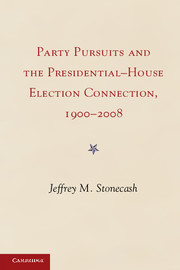Book contents
- Frontmatter
- Contents
- Preface
- Part I Election Patterns and INTERPRETIVE Frameworks
- Part II Explaining a Changing Relationship
- 5 The Democratic Pursuit of the North
- 6 Expanding the Democratic Base
- 7 Republican and Democratic Pursuits of New Constituencies
- 8 The Consequences of Changing Electoral Bases
- 9 Regional Patterns of Change
- 10 Realignment and Converging Results
- 11 Party Pursuits and American Democracy
- Appendix I Presidential–House Elections by House Districts
- Appendix II The Presidential–House Relationship and Uncontested Races
- Appendix III Alternative Explanations of Change
- Bibliography
- Index
- References
5 - The Democratic Pursuit of the North
Published online by Cambridge University Press: 05 January 2013
- Frontmatter
- Contents
- Preface
- Part I Election Patterns and INTERPRETIVE Frameworks
- Part II Explaining a Changing Relationship
- 5 The Democratic Pursuit of the North
- 6 Expanding the Democratic Base
- 7 Republican and Democratic Pursuits of New Constituencies
- 8 The Consequences of Changing Electoral Bases
- 9 Regional Patterns of Change
- 10 Realignment and Converging Results
- 11 Party Pursuits and American Democracy
- Appendix I Presidential–House Elections by House Districts
- Appendix II The Presidential–House Relationship and Uncontested Races
- Appendix III Alternative Explanations of Change
- Bibliography
- Index
- References
Summary
In the years following the 1896 election, the nation was dominated by Republicans. Democrats had to expand their electoral base to have a chance to be the majority party. To begin with presidential elections, over half of the nation's Electoral College votes came from the North, and Republicans won a very high percentage of them (Table 5.1). Roughly one-fourth came from western states, and Republicans also did well there. The dominance of Republicans put enormous pressure on Democrats to change their appeal and expand their electoral base.
As the table indicates, Democrats did very well in the South, winning an average of 67.6 percent of the popular vote and 90.4 percent of the Electoral College votes within that region. The party won only 14.2 percent of Electoral College votes within the North and 34.1 percent within the remainder of the nation. It was a party with its base in the South and with a record of only limited success outside that region. It was also a party regularly losing presidential elections.
- Type
- Chapter
- Information
- Publisher: Cambridge University PressPrint publication year: 2012



